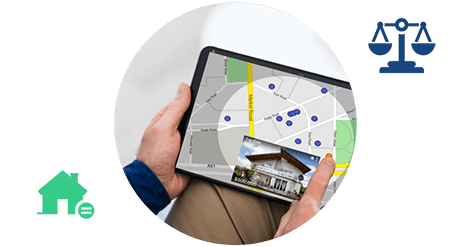How To Find And Use Real Estate Comps In Your Area

Whether you're selling or buying a home, using comparables is key to understanding what buyers have been ready to spend on similar properties.
Real estate comparables, or "comps", are an essential tool for investors, agents, buyers, and sellers alike - and, in today's market, it's more important than ever to use comparables and a comparative market analysis (CMA) no matter which end of the transaction you're on.
As public data becomes increasingly accessible, finding and using comparables is something anyone can do. In this guide, we'll break down:
- What Are Real Estate Comps?
- Who Uses Real Estate Comps?
- What Are The Benefits Of Using Real Estate Comps?
- The 3 Best Ways To Find Real Estate Comps
- How To Use Real Estate Comps
Looking for comps in your area? |
What are Real Estate Comps?
At the highest level, real estate comps are data assets describing the market performance of similar recently sold properties in the same geographic area.
Leveraging comps in real estate transactions introduces many benefits revolving around setting your expectations for upcoming transaction outcomes.
Since you can't necessarily tell the future to determine precisely how a specific property will perform or how a transaction will play out, the best insights come from looking at how similar properties and transactions have unfolded recently.
Let's say you're looking to sell a 2,200 sqft. home with four bedrooms and three bathrooms on a .25 acre lot. If you're looking to determine the market value of a home with the same number of beds, baths, etc., you would use your home's criteria to find real estate comps in the same neighborhood that have recently sold.
Who Uses Real Estate Comps?
As mentioned before, real estate comps are used by various real estate professionals, homeowners, and buyers alike for various reasons. Let's take a look at a few:
- Licensed real estate agents use MLS comps to help estimate fair market value, negotiate prices for buyers, and competitively price listings for seller clients. If you're a real estate agent, it's common to default to pulling comps from an MLS software. Still, local MLS comps will only sometimes provide the strong, hyper-accurate data required to inform a winning transaction strategy.
- Real estate investors can use comparables to guide investment decisions and inform strategies.
- Home buyers and sellers benefit from real estate comps since it gives them an idea of what their home is worth in the current market, and how other similar properties in the area performed on the market.
- Real estate appraisers also work with real estate comps to access property sale data and form accurate real estate valuations.
As with any data set, real estate professionals must use this data intelligently and with a specific goal in mind to maximize benefits for their businesses and clients. Your business should only use data on comparable properties informed by accurate, real-time data.
When properly leveraged, accurate real estate comps offer advanced insights to help you make the best financial decisions for yourself, your clients, and your business.
What are the benefits of using real estate comps?
At the highest level, analyzing comparable property data gives you an accurate view of a local housing market at a specific point in time.
Real estate markets are always in flux, and transaction outcomes are relative to external market conditions.
To be able to answer the big questions — such as "what's a realistic price I should expect to pay when purchasing a home in my neighborhood right now?", "what's a typical asking price of a home with the same square footage as mine?" and "how valuable is this property investment?" — house comps provide a timely snapshot of how other properties fared on the market.
Real estate comps provide real estate professionals and clients with the data they need to understand better how market conditions, historical home value and transaction data, and a property's location will likely impact the transaction.
For instance, each real estate profession has its use case for using comps or generating a comparative market analysis. In particular, they:
- Help real estate investors identify the best opportunities for comparable properties in their target markets
- Help investors determine whether or not certain properties are worth the selling prices
- Help home buyers browsing homes for sale understand the appropriate asking price and how much they should expect to pay for the type of property they are pursuing.
- Help sellers set a competitive, realistic listing price for their property's sales transaction.
- Help real estate agents inform their clients about recently sold homes in the local real estate market.
- Help real estate agents form proactive strategies to boost transaction outcomes for clients.
- Help a professional appraiser arrive at the fair market value of homes in the current market.
You can then use this information to form your expectations concerning the property you're working with.
What do real estate comparables include?
The information included in housing comps varies depending on where you source your comparables. However, here is an overview of the information you can expect to find within real estate comps.
PropertyRadar's real estate comps
PropertyRadar's real estate comps include the following information:
- Number of bedrooms
- Number of bathrooms
- Square footage
- Year built
- Purchase data
- Property type
- Sales price
- Dollar per square foot
- Percent match
- Total comparable value
- Property address
- A map to visualize location and neighborhood
- Type of transaction (short sale, market flip, REO resale, etc.)
- Foreclosure options
- Current listing options
- Recent sales options
Zillow's real estate comps
Zillow's real estate comps include the following information:
- Number of bedrooms
- Number of bathrooms
- Square footage
- Date of sale
- Property address
- Estimated value
- Estimated sales range
- Estimated price per square foot
Redfin's real estate comps
Redfin's real estate comps include the following information:
- Number of bedrooms
- Number of bathrooms
- Property type
- Square footage
- Lot size
- Year built
Looking for comps in your area? |
The 3 Best Ways To Find Comps
With access to public records data more widely available than ever, there are several options to pull real estate comps.
Whether you're a real estate agent, investor, or property-centric business owner looking to market to property owners of a certain type of home, determining a strategy for finding comps is essential.
Here are some of the best ways to find house comps in your area:
#1: Using Real Estate Intelligence Software
Real estate intelligence software is a property information platform powered by real estate data, including property insights, owner information, and more.
By leveraging reputable software like PropertyRadar, you can generate a list of incredibly accurate comps, arrive at the true value of a home, and utilize amazing insights into local area trends.
PropertyRadar is quick to generate a report of comparable homes, streamlining the process of understanding the value of a specific property. In addition, PropertyRadar's comp tool displays ten recent sales and ten recent listings, giving you a robust, birds-eye-view perspective of your local market.
By looking at both recent, comparable sales and recent listings, you will be able to gauge how past listings have performed and how current listings are performing.
This allows you to understand better how a property might perform on the market in real-time compared to only looking at past, outdated sales information.
#2: Conducting Market Research
Putting together thorough market research is another way to find your area's comps reliably.
You can use resources such as public property records data or the local multiple listing service to navigate similar properties. However, if you try to do this manually or without the aid of a technology platform, it can be a cumbersome process.
Again, we recommend building a list in PropertyRadar using the same criteria as the property you're working with.
That way, you'll have all the best comps data at your fingertips without spending an enormous amount of time manually aggregating comps data.
For example, if the home you're comparing has three bedrooms, two bathrooms, and a pool, set that criteria within the geographic boundaries of the property you're researching. The best advice is to get as specific as possible to generate the most accurate comparables and determine the value of the property.
Include as much property information as possible, including property type, square feet, year built, etc.
Once you've set your criteria to look for properties matching the home in question, build a list of off-marketing comps. Check the "Insights" tab to see the average value, average price, and other details from your freshly generated list of accurate comps.
#3: Searching Sales Histories
Another method of pulling comps to determine the value of a property is to perform market research online by searching through sales histories that are publicly available on the internet.
To do this, you can leverage free industry resources such as Realtor.com, Redfin, and Zillow. By searching for properties that have sold in your area that match your property's criteria, you can get an idea of how the property you're interested in will perform on the market.
However, this approach is generally much less accurate than a dynamic list generated by a public records information database.
These generic options only allow you to access as much data, and verifying the information is not straightforward. For example, you need to know when the information was last updated, or if it accurately reflects exact transaction metrics.
How to use real estate comps
Now that you have gathered the information from your real estate comps, what are the next steps? How do you best use this information to serve your professional interests, business, and clients?
Here are some ways that you can put your comps to good use:
#1: Determining The Value of a Property For Sale
Once you have pulled comparables, you are on track to accurately price a listing for one of your seller clients.
After studying your comparables data, consider the similarities and differences between the original property and the comparables. For example, does your listing have special features that could increase the home's selling price?
Or, are there any simple in-demand property upgrades you can leverage to increase the home's value before listing?
Consider this information as you use comparables to inform the pricing process for listings you are posting on the market for your sellers.
#2: Helping Your Buyer Clients Set an Accurate Budget
Viewing comparable listings can help real estate agents discuss a realistic budget for your buyer clients. Then, present the data to them in an easily-digestible format to talk about their options.
This process can help buyers begin their home financing process since they better understand how much their target property types will likely cost.
#3: Vetting Investment Opportunities
Real estate investors should run comparables every time they acquire a new property. This information is critical for determining the ROI potential in a real estate opportunity, allowing an investor to decide whether or not it's worth it to move forward with the purchase.
Investors can also leverage real estate comps to find high-ROI properties in their area that they want to add to their farm or prospect list.
Recap
Whether you're a real estate agent, investor, buyer, or seller, finding the most accurate comps is essential to making the most financially sound transaction.
With the real estate market in flux, ensuring that you find comparables with as much accurate data as possible will outweigh other factors that may influence your decision.
Knowing what to look for, whether it's finding comps with similar square footage, that are in the same school district, or sold for similar values can lead to sound financial and emotional outcomes for a transaction.
Looking for comparables in your area? Get started with PropertyRadar to instantly find comps today!



